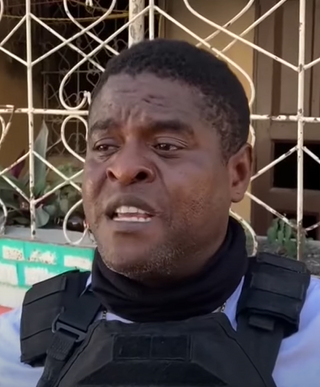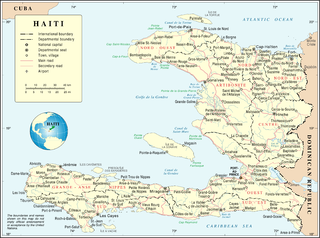Related Research Articles

Port-au-Prince is the capital and most populous city of Haiti. The city's population was estimated at 1,200,000 in 2022 with the metropolitan area estimated at a population of 2,618,894. The metropolitan area is defined by the IHSI as including the communes of Port-au-Prince, Delmas, Cite Soleil, Tabarre, Carrefour, and Pétion-Ville.

Cap-Haïtien, typically spelled Cape Haitien in English and often locally referred to as Le Cap, Okap or Au Cap, is a commune of about 274,000 people on the north coast of Haiti and capital of the department of Nord. Previously named Cap‑Français and Cap‑Henri during the rule of Henri I, it was historically nicknamed the Paris of the Antilles, because of its wealth and sophistication, expressed through its architecture and artistic life. It was an important city during the colonial period, serving as the capital of the French Colony of Saint-Domingue from the city's formal foundation in 1711 until 1770 when the capital was moved to Port-au-Prince. After the Haitian Revolution, it became the capital of the Kingdom of Haiti under King Henri I until 1820.

The United Nations Stabilisation Mission in Haiti, also known as MINUSTAH, an acronym of its French name, was a UN peacekeeping mission in Haiti from 2004 to 2017. It was composed of 2,366 military personnel and 2,533 police, supported by international civilian personnel, a local civilian staff, and United Nations Volunteers. The mission's military component was led by the Brazilian Army and commanded by a Brazilian.

Cité Soleil is an extremely impoverished and densely populated commune located in the Port-au-Prince metropolitan area in Haiti. Cité Soleil originally developed as a shanty town and grew to an estimated 200,000 to 400,000 residents, the majority of whom live in extreme poverty. The area is generally regarded as one of the poorest and most dangerous areas of the Western Hemisphere and it is one of the biggest slums in the Northern Hemisphere. The area has virtually no sewers and has a poorly maintained open canal system that serves as its sewage system, few formal businesses but many local commercial activities and enterprises, sporadic but largely unpaid for electricity, a few hospitals, and two government schools, Lycée Nationale de Cité Soleil, and École Nationale de Cité Soleil. For several years until 2007, the area was ruled by a number of gangs, each controlling their own sectors. But government control was reestablished after a series of operations in early 2007 by the United Nations Stabilization Mission in Haiti (MINUSTAH) with the participation of the local population.
The Cité Soleil raid of 2007 began on February 10, 2007, in the Cité Soleil district of Port-au-Prince, capital city of Haiti. It was intended to crack down on a notorious gang leader called "Evans". The raid was part of the United Nations Stabilisation Mission in Haiti.
Crime in Haiti is investigated by the Haitian police. Since the late 2010s, the country has suffered from widespread gang warfare and civil unrest, including a massive prison breakout in 2024. It also suffers from extreme corruption and high levels of sexual violence.

Protests began in cities throughout Haiti on 7 July 2018 in response to increased fuel prices. Over time, these protests evolved into demands for the resignation of Jovenel Moïse, the then-president of Haiti. Led by opposition politician Jean-Charles Moïse, protesters stated that their goals were to create a transitional government, provide social programs, and prosecute allegedly corrupt officials. From 2019 to 2021, there were massive protests calling for the Jovenel Moïse government to resign. Moïse had come in first in the 2016 presidential election, for which voter turnout was 21%. The 2015 elections had been annulled due to fraud. On 7 February 2021, supporters of the opposition allegedly attempted a coup d'état, leading to 23 arrests, as well as clashes between protestors and police.
Events in the year 2021 in Haiti.

Jimmy Chérizier, nicknamed Barbecue, is a Haitian gang leader, former police officer, and warlord who is the head of the Revolutionary Forces of the G9 Family and Allies, abbreviated as "G9" or "FRG9", a federation of over a dozen Haitian gangs based in Port-au-Prince. Known for often making public appearances in military camouflage and a beret, he calls himself the leader of an "armed revolution". He had close connections with the Haitian Tèt Kale Party and was closely allied with Haitian president Jovenel Moïse until his assassination in 2021. Considered the most powerful gang leader and war criminal in Haiti, he is also currently believed to be one of the country's most powerful figures. He is believed to be responsible for numerous large-scale massacres against civilians in the Port-au-Prince area.
In July 2022, an outbreak of gang violence occurred in the Haitian capital of Port-au-Prince, leaving 89 people dead and over 74 injured.
Events in the year 2022 in Haiti.
The socioeconomic and political crisis in Haiti has been marked by rising energy prices due to the 2022 global energy crisis, as well as protests, and civil unrest against the government of Haiti, armed gang violence, an outbreak of cholera, shortages of fuel and clean drinking water, as well as widespread acute hunger. It is a continuation of instability and protests that began in 2018.

Since 2020, Haiti's capital Port-au-Prince has been the site of an ongoing gang war between two major criminal groups and their allies: the Revolutionary Forces of the G9 Family and Allies and the G-Pep. The Government of Haiti and Haitian security forces have struggled to maintain their control of Port-au-Prince amid this conflict, with gangs reportedly controlling up to 90% of the city by 2023. In response to the escalating gang fighting, an armed vigilante movement, known as bwa kale, also emerged, with the purpose of fighting the gangs. On 2 October 2023, United Nations Security Council Resolution 2699 was approved, authorizing a Kenya-led "multinational security support mission" to Haiti.
Events in the year 2023 in Haiti. Haiti still had no president, no parliamentary quorum, and a dysfunctional high court due to a lack of judges, with another news report of violent uprisings across the country, realizing they were sent by the gangs while the other families and neighbors escape from a burning capital Port-au-Prince. The government invoked a martial law across Haiti in an effort to contain gang violence. The police and the military are forced to withdraw from their posts when their bases and police stations throughout Haiti are destroyed by more gangs who had also planted weapons in the area to provoke participation. Haiti is effectively destroyed by violence that no longer controls the island country after its long history of natural disasters and political chaos, more than three million Haitian migrants sailed to Florida in the U.S. as refugees, and black civilians in Haiti are rallying to fight back against gang corruption.
Between April 24 and May 6, 2022, clashes broke out between the 400 Mawozo gang and the Chen Mechan gang in Plaine du Cul-de-Sac, Port-au-Prince, Haiti. Nearly 200 people were killed, many of whom were civilians.
The Bel Air massacre was a series of shootings, extrajudicial killings, and massacres that took place in the Bel Air neighborhood of Port-au-Prince, Haiti between August 2020 and May 2021. Between August and October 2020, G9 An Fanmi e Alye members attacked Bel Air residents, with continued attacks by the affiliated Krache Dife gang. The massacres died down until March 31, whenever renewed attacks began, sparking battles with Bel Air residents who defended themselves.
Events in the year 2024 in Haiti.
Between January 10 and 26, 2023, eighteen police officers were killed by Gan Grif, a gang operating in Port-au-Prince. The killings sparked riots in Port-au-Prince by Haitian police officers and police-affiliated gang Fantom 509, along with international condemnation.

Amid the unrest in Haiti since 2018, armed gangs stormed Haiti's two largest prisons in March 2024, resulting in more than 4,700 inmates escaping. The gangs demanded that prime minister Ariel Henry resign, attacking and closing Toussaint Louverture International Airport and preventing Henry from entering the country. The Haitian government declared a 72-hour state of emergency and a nighttime curfew in Ouest Department in an attempt to curb the violence and chaos. On 12 March 2024, Henry indicated his intention to resign as prime minister in response to the deteriorating security situation.
References
- ↑ Topchi, Ali. "'Gangsters' kill residents, burn homes in Haiti town". 'Gangsters' kill residents, burn homes in Haiti town. Retrieved 2023-05-22.
- 1 2 "At least 12 killed as gangs battle for control around Haiti's capital". www.cbsnews.com. 2022-12-02. Retrieved 2023-05-22.
- ↑ Arocha, María Fernanda (2022-11-16). "Regional Overview: Mexico, Central America, and the Caribbean 5-11 November 2022". ACLED. Retrieved 2023-05-22.
- 1 2 3 4 "Massacre de civils en Haïti: les gangs tuent et incendient pour reprendre le contrôle de Cabaret". RFI (in French). 2022-12-01. Retrieved 2023-05-22.
- ↑ "Armed gangs kill 12 in Haiti as public security crisis deepens". www.aljazeera.com. Retrieved 2023-05-22.
- ↑ Arocha, Yohaire Zumbado-Madrigal, María Fernanda (2022-12-07). "Regional Overview: Mexico, Central America, and the Caribbean 26 November-2 December 2022". ACLED. Retrieved 2023-05-22.
{{cite web}}: CS1 maint: multiple names: authors list (link)